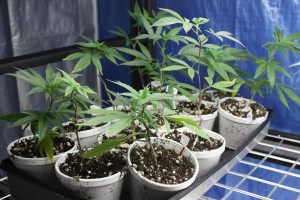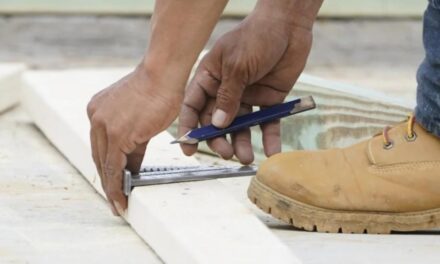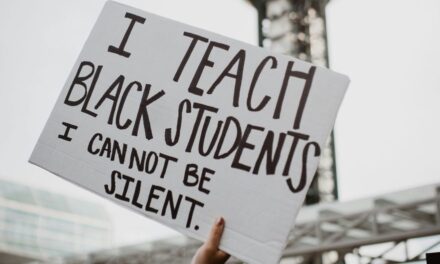
Cannabis production and sales is a booming industry from which Black entrepreneurs have been marginalized. A Marijuana Business Daily survey at the end of 2017 found that just 4.3% of the owners and founders of cannabis businesses were African-American. (Courtesy Photo)
By Anthony McAuley
The Associated Press via The Times-Picayune/The New Orleans Advocate undefined
Peter Labat and his wife Venia are a bit bemused, but also excited, to be among a group of around 2,000 budding marijuana entrepreneurs slated to participate in the first ever Black CannaCon in late November at the Ernest N. Morial Convention Center.
Since starting their business last year in New Orleans East, they’ve been surprised to find that The Labat Wood Shop’s hottest item by far has been their custom-made joint rolling trays. So, they’re looking forward to exhibiting at the show and learning about one of the fastest-growing industries in the country.
“The idea of going to a cannabis expo still seems kind of fantastical, almost Disney World-ish to me,” said Peter Labat. “Here in New Orleans, the cannabis culture is not that strong compared to places like Las Vegas or California, where it’s been fully legal for a while. So, learning about dispensaries, growing, distribution— it’s a whole new world.”
Louisiana’s cannabis laws had been among the most restrictive in the country, even for medicinal use, though recent changes have loosened things up. In June, Gov. John Bel Edwards signed into law a lift of the ban on whole flower and smoking, restrictions which made the medical marijuana business unviable. That will take effect at the start of next year.
The idea for a convention and expo aimed exclusively at Black cannabis professionals came to Kristi Price, publisher of Black CannaBusiness Magazine, last November when an informal online gathering she organized attracted more than 600 participants who ended up clamoring for a larger, in-person event to carry on the conversation, she said.
Price, a long-time marketing executive who had worked for brands like Nike, Red Bull, and Guinness over the past two decades, started her Houston-based media company in 2019, partly with the idea of addressing what she saw as the deep disparity in the way the cannabis industry was developing.
“There are no business-to-business media or conferences that target people of color in this space and people of color have a very different experience with the plant, both in terms of the criminal justice system and from the diversity and inclusion perspective,” she said.

“Cannabis as medicine is huge in the Black community,” said Kristi Price, publisher of Black CannaBusiness Magazine and convener of the first Black CannaCon, which will take place in New Orleans in late November. (Courtesy Photo)
Indeed, the disparity in the criminal justice system is well established and has continued even as decriminalization and legalization of cannabis has spread.
A study published last year by the American Civil Liberties Union covering all 50 states (and the District of Columbia) found that arrests for marijuana possession were actually up in the eight years through 2018 compared to a previous study ACLU made of the years 2002 through 2010.
For the latest period, not only were arrests up but the racial disparity in those arrests remained the same: “On average, a Black person is 3.64 times more likely to be arrested for marijuana possession than a white person, even though Black and white people use marijuana at similar rates,” the study found.
At the same time, Black entrepreneurs have trailed behind their White counterparts as the cannabis market has boomed. A Marijuana Business Daily survey at the end of 2017 found that just 4.3% of the owners and founders of cannabis businesses were African-American.
That level of participation has changed little in the last five years. In December the U.S. House of Representatives passed the Marijuana Opportunity Reinvestment and Expungement Act, which contains a number of measures aimed at helping to redress the imbalance. They include the expungement of criminal records that hinder people from going into the cannabis business. Also, it has provisions to set aside cannabis growing and dispensary concessions for Black proprietors, and it calls for setting up a special trust funded by cannabis tax to give startups a leg up. It still needs to be passed by the Senate.
These and other issues at Black CannaCon will be discussed by speakers like Wanda James, a former Naval officer, senior executive at Fortune 100 insurance companies, and economic advisor to former president Barack Obama. James, together with her husband, founded the first African-American owned cannabis dispensary in the U.S.
In addition to being CEO of Simply Pure Dispensary in Denver and the managing partner at the Cannabis Global Initiative, James is a long-time political campaigner for cannabis legalization and managed two successful U.S. Congressional campaigns in her home state of Colorado.
Price, who hails from Houma and is a graduate of Southern University in Baton Rouge, said the expo program will cover topics like capital raising and cultivation, politics, technology, and wellness issues.
“Cannabis as medicine is huge in the Black community,” says Price, though she notes that despite the strides that have been made in areas of particular interest to the Black community, like sickle cell anemia and high blood pressure, there is still a big knowledge gap.
“It used to be that if you tell grandma that you’re in the cannabis business she’d be getting your bail money together, so that is some of the work we have to do,” she said.
To that end, one of the keynote speakers at Black CannaCon will be Dr. Chanda Macias, who was Queen Zulu last year and has been a proselytizer for cannabis and its medicinal uses for a decade-and-a-half in Louisiana.
Labat, the woodworker who has found himself part of an industry that is growing at about 17% a year in the U.S. and forecast to reach $30 billion by 2025, said he is pleased by the progress toward normalizing the business.
“It will be nice to connect with cannabis users who are entrepreneurs, who have kids, well-paying jobs, and are responsible adults who happen to use cannabis,” he said. “It is really just a normal part of lifestyle now and a good business opportunity.”
Help us Continue to tell OUR Story and join the AFRO family as a member – subscribers are now members! Join here!
The post 1st Black cannabis entrepreneurs expo coming to New Orleans appeared first on AFRO American Newspapers .











